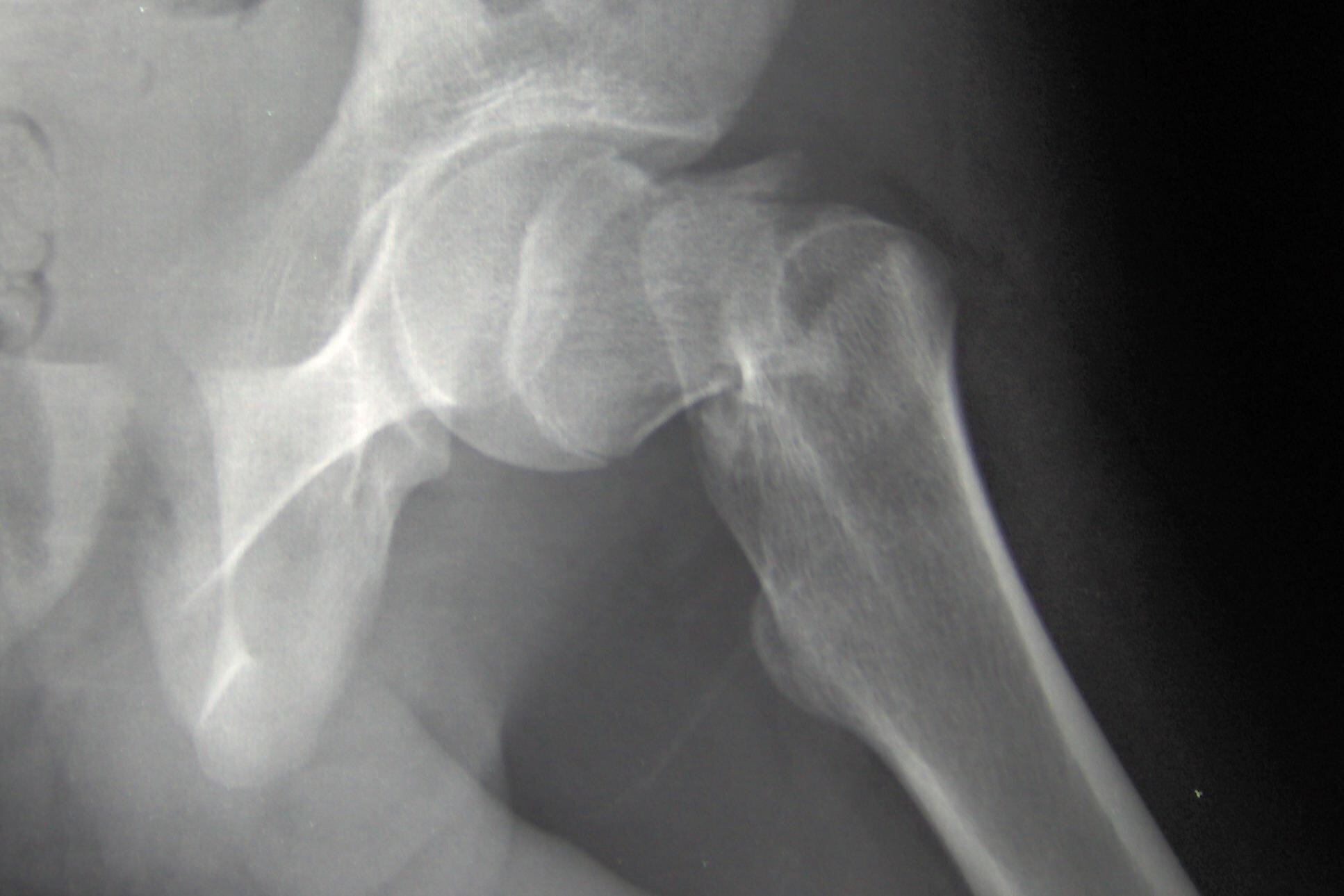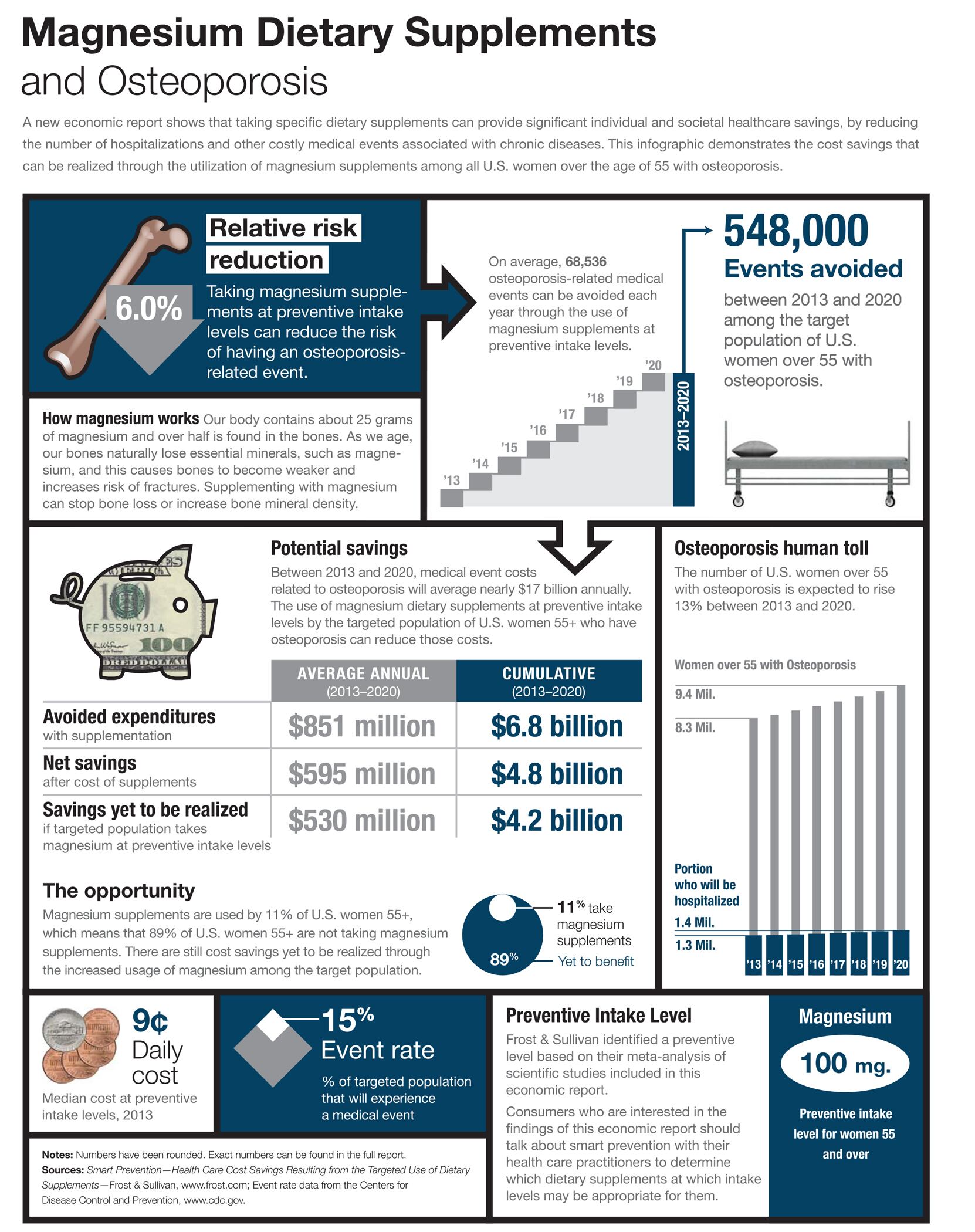The National Institutes of Health (NIH) lists magnesium as being necessary for more than 300 biochemical reactions in the body, from helping maintain normal muscle and nerve function, to keeping heart rhythm steady, supporting a healthy immune system, and keeping bones strong. The mineral is also needed for blood sugar management, and healthy blood pressure.
In Europe, the difficult to please European Food Safety Authority (EFSA) has issued positive opinions on magnesium and the maintenance of normal bone, teeth, and protein synthesis; the reduction of tiredness and fatigue; electrolyte balance; normal energy-yielding metabolism; neurotransmission, and muscle contraction.
The health benefits of magnesium appear to be matched by the potential economic benefits of magnesium supplementation.
A report by Frost & Sullivan and commissioned by the Council for Responsible Nutrition (CRN) Foundation found that taking magnesium supplements at preventive intake levels (100 mg per day for women 55 and over) could reduce the risk of having an osteoporosis-related event by 6%, which equates to about 69,000 osteoporosis-related medical events each year.
The potential net savings after accounting for magnesium supplement costs could be $595.3 million annually, said the report. And with 10% of this population already taking magnesium supplements, the overall savings per year could be $530 million. This produces cumulative savings from 2013-2020 of about $4.2 billion in the US alone (see infographic below).
The market
The ultimate benefits of magnesium supplements could be many magnitudes greater, given that between 70 and 80% of the US population are not meeting their recommended intakes of magnesium.
Consumers and healthcare professionals are waking up to the issue, and magnesium supplement sales are on the rise. According to SPINS, US sales of magnesium supplements in natural (excluding Whole Foods) and conventional outlet (including Walmart) grew by almost 20% from 2011 to 2012, to be worth $67,875,702. Growth from 2010 to 2011 was 15%.
The science

The science, as can be expected, is an ongoing endeavor. A recent review in Nutrients concluded that, “[a]lthough the evidence is still fragmentary, most of the experimental and clinical data available in the literature point to magnesium as a contributor factor to bone health.
“Consequently, optimizing magnesium intake might represent an effective and low-cost preventive measure against osteoporosis in individuals with documented magnesium deficiency,” wrote the reviewers, led by Sara Castiglioni from the University of Milan.
Reducing the risk of osteoporosis and osteoporosis-related events has focused a lot on boost bone density (BMD) in high-risk post-menopausal women by improved diet or supplements, but another approach is to maximize the build-up of bone during the highly important pubescent years is seen as one of the two best ways to reduce the risk of osteoporosis later in life. About 35% of a mature adult's peak bone mass is built-up during puberty.
Castiglioni and her co-authors note that pre-adolescent dietary intake of magnesium is positively related to BMD in young adulthood, “and that magnesium supplementation for 12 months has a positive effect on the accrual of bone mass in the hip of peripuberal Caucasian girls.
“magnesium supplementation is therefore important in the periadolescent group, given the suboptimal dietary magnesium intake documented in food surveys in western countries. It is also interesting that magnesium intake is an independent predictor of bone density in young elite swimmers.”
As with many nutrients, it could be possible to have too much of a good thing, and data from the Women’s Health Initiative Study suggested that postmenopausal women with the highest average intakes of magnesium may at higher risk of wrist fracture.
“These results are in keeping with some data showing that elevated magnesium might have harmful effects on osseous metabolism and parathyroid gland function, leading to mineralization defects,” wrote Castiglioni et al.
Finally, one interesting area of research concerns the link between magnesium deficiency and dysfunction of the endothelium - the thin layer of cells lining the blood vessels – with research linking endothelial health and bone health.
“On these bases, it is tempting to speculate about the possibility that osteoporosis might be considered a vascular disease of the bone.”
Source: Nutrients
Volume 5, Number 8, Pages 3022-3033, doi: 10.3390/nu5083022
“Magnesium and osteoporosis: current state of knowledge and future research directions”
Authors: S. Castiglioni, A. Cazzaniga, W. Albisetti, J.A. Maier


